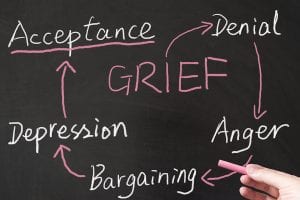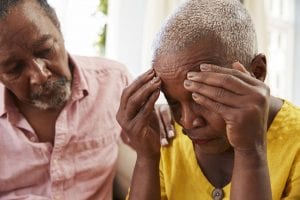Grief in the Time of COVID: Why We Need to Reflect, Remember, Rest, Recharge, Refocus, Resolve and Have Curiosity.
By Trina O’Quinn for the NABBW

The Kubler-Ross Grief Cycle
I ended my last blog post, in which I discussed how I was dealing with the losses generated by the COVID pandemic, with a plan to Reflect, Remember, Rest, Recharge, Refocus, Resolve and have Curiosity while doing the “six Rs of grief.” As time has moved forward, I have tried to separate the steps and work on them in a vertical progression.
A month later, I am finding that as I try to go through the stages of grief, I am not achieving the usual result. So I have decided to grieve on a continuum, knowing that the stages will overlap or at least bleed into the other.
Sometimes this is effective when we are grieving over many different losses. Or it can happen over one loss, such as the loss of a spouse, partner or child.
As I write this I am in grief for many reasons.
The most current is that my husband and I just had a good friend die. We had been friends for 60+ years. It has only been a few days. What I am beginning to recognize is that this underlying sadness is actually the way I have been feeling over the past few months.
By contrast, I lost a friend of almost 30 years before the “Stay-At-Home-Self-Isolating Order” was given. The two send offs are going to be extremely different. The first was a big celebration with lots of people, music, food and sharing. We were able to collective sing our friend home. The second death is not going to be that way. At this point, he will be buried, then celebrated later when it’s safe to gather with family and friends. Presently I do not know when or how that will occur.
 In looking at this, I realize that I am experiencing complicated grief. I am in a different stage of grief with each of these deaths. The second is interrupting my grieving for the first. And my grieving for both deaths is being interrupted by the COVID-19 Pandemic.
In looking at this, I realize that I am experiencing complicated grief. I am in a different stage of grief with each of these deaths. The second is interrupting my grieving for the first. And my grieving for both deaths is being interrupted by the COVID-19 Pandemic.
This constant buffeting of grief reminds me of my experiences with body surfing and jumping waves in the Pacific Ocean when I was young. Sometimes when I was knocked down by a wave, another would crash into me before I could regain my balance. If that happened too many times, I became exhausted and could no longer stand up.
I am feeling close to that same sort of exhaustion as I write this blog. But it’s emotional exhaustion, not physical exhaustion. I’ve realized that what I’m dealing with is more than the the deaths of two friends. It is much more. It is recognized grief covered with unrecognized grief, which is a term for a loss that is not acknowledged by society. The latter is sometimes referred to as Disenfranchised Grief.
Some examples of Disenfranchised Grief are:
- Loss of people we do not know, as happens with mass shootings, plane crashes or bombings
- Miscarriages or loss of an ex-spouse, a grandchild or a mother’s loss in giving up a child to adoption
- Loss of leadership
- Loss of a job
- Socialization
- Emotional support
- Family visitations
- Safety
While doing this reflection and remembering the things I have lost, it has become clear to me that I am experiencing the following stages of grief on a personal level: Denial, Anger, Bargaining and some Sadness. Depending on the thought or memory I am experiencing is where I am in this process.
As each stage of grief is relatively resolved; rarely is it completely resolved in some final way, as I have been taught to expect. Therefore, I can periodically be brought back/pushed back to an earlier grief stage.
So I have to experience that earlier stage some more before I can again move forward. When a loss is deeply significant and possibly be traumatic, I can re-experience it for many years as I revisit the loss. The loss of a spouse, partner or child is such a loss, especially if the relationship was especially meaningful.
In some ways, I may never completely be done with the grief, but I will learn to live with it with less intense pain.
As a nation we are all over the place. Without national recognition of the pandemic, we are not moving through grief at all; we are experiencing Denial, Anger, Bargaining and some Sadness and we are trying to jump to making meaning and accepting without recognizing that a traumatic event is occurring. As I move through my own process I am aware of where we are as a nation and I am reflecting on both.

Trina O’Quinn
Over the next few months I will be talking about disenfranchised grief and the wisdom I am gaining from reflecting on the concept. You will read my learning in this blog. Remember to Reflect, Remember, Rest, Recharge, Refocus, Resolve and be Curious. These can be done in the order they arrive in your awareness
Trina O’Quinn is an actively licensed (California License #LMFT27407) Marriage and Family Therapist. Entering the profession as an older adult, Trina was in private practice for 30 years. During her career she was a lecturer at California University Dominguez Hills in the Marital and Family Therapy Program, where she supervised many students and mentored many associates.
Now retired, Trina keeps busy enjoying needle arts, reading, journaling and writing, as well as singing with a women’s chorus, peer networking, volunteering at a senior living center and reconnecting with old friends.



Leave a Reply
You must be logged in to post a comment.